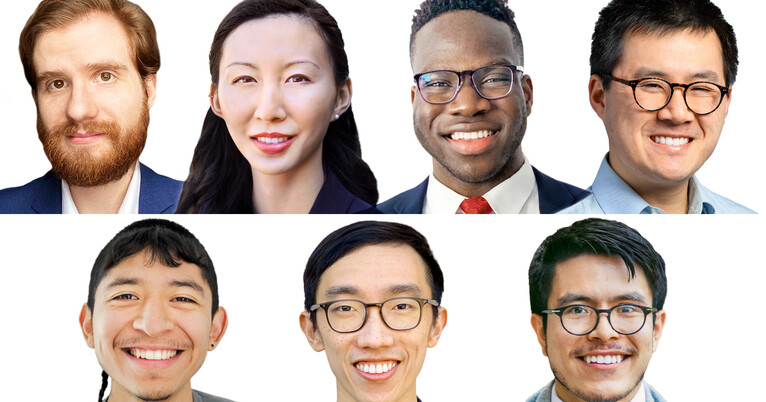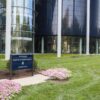Seven Yale affiliates awarded Paul and Daisy Soros Fellowship for New Americans
The new class of Yale college and graduate students join 26 other recipients of the highly competitive fellowship.

Yale News
On Thursday, seven Yale affiliates, including four graduates of Yale College, were awarded the Paul and Daisy Soros Fellowship for New Americans, a merit-based scholarship specifically for immigrants and the children of immigrants.
Yale College graduates Katherine Fang ’17, Sergio Infante ’18, James Diao ’18 and Harold Ekeh ’19 in addition to three Yale affiliates — Nikolas Oktaba GRD ’25, Ryan Chow GRD ’22 MED ’22 and Jonathan Herrera Soto ART ’23 — join 26 other recipients of the highly competitive fellowship.
Established in 1997, the fellowship is available to graduate students in a variety of fields, from medicine and law to the social sciences and art. This year, it received a record-breaking 2,445 applicants, out of which just 30 fellows were selected. Successful applicants are given a grant of $90,000, the most generous grant for law school students in the country. Five of the seven Yale affiliated recipients spoke to the News about their backgrounds and the work they intend to do as Soros Fellows. Ekeh and Oktaba did not respond to a request for comment by the time of publication.
“I’ve always been interested in how political institutions respond to ordinary citizens,” Fang wrote in an email to the News. “I am aware I won this fellowship in the midst of a banner year of violence against Asian Americans. Asian Americans are grappling anew with what their democratic participation might look like. As we fight to ensure our community remains physically safe, I also hope we take the broad, long view of interrelated political issues.”
All three of the graduates of Yale College who spoke with the News have an interest in the role that race plays in society. Race features directly in the work and interests of Fang and Diao and was a significant component in the undergraduate experience of Infante, who was in Grace Hopper College during its renaming process from Calhoun College.
Fang is pursuing a joint J.D./Ph.D. degree at the Yale Law School and the School of Management, Infante is pursuing a doctorate in history at Yale, Diao is pursuing an M.D. degree at Harvard Medical School and the Massachusetts Institute of Technology, and Ekeh is pursuing a law degree at Columbia University.
Nikka Landau, director of communications and strategic initiatives for the Soros Fellowship, wrote in an email to the News that the scholarship is awarded to graduate students “who are poised to make significant contributions to US society, culture, or their academic field.”
In order to be eligible for the fellowship, Landau said that applicants must either be green card holders, naturalized citizens, individuals born abroad who graduated from both high school and college in the United States — a category which includes Deferred Action for Childhood Arrivals recipients — or the United States-born children of two immigrants.
Fang and Diao’s parents followed a surprisingly similar trajectory to the United States. Their parents were both born in China during the Cultural Revolution; their fathers were both from small villages and spent part of their education in Germany before moving to Houston. Both Fang’s and Diao’s grandparents later moved to the U.S. to help raise them.
Infante was born overseas, in Bogotá, Colombia, and moved to Houston at the age of five. Soto’s parents immigrated from Mexico in the early 1990s, and he was born and raised in the United States as the first U.S. citizen in his immediate family.
“I came to Yale knowing right off the bat that I wanted to be a historian,” Infante said. “I was very lucky because I didn’t know at the time that Yale had such a strong community of historians and such a fervent group of students studying history at the undergraduate level.”
As a Soros Fellow in the Department of History, Infante intends to pursue a doctorate in transnational history, focusing on the “European spaceport” in French Guiana, examining particularly the experience of migrant laborers. Infante described a personal relationship to French Guiana, where his grandparents moved for work when his father was very young, mirroring Infante’s own migration story.
Fang similarly explained that there is a personal connection between her work and her family’s history, and noted in particular her grandmother’s experience.
“She’d brought up five children in the era of Mao on little besides folk medicine and a fierce belief that girls and boys were equal,” Fang said. “She was always really astonished that in America, you could find coins people had dropped on the streets. I’ve developed fuller views since then of how complicated social mobility is in the U.S., but I do hold on to her belief that this country is special, its institutions worth fighting to perfect for all people.”
She said she wants to see Asian American participation in American political life broaden and to ensure that her community is not perceived as politically uniform or as a group of “single issue voters.”
As a joint J.D./Ph.D. student, Fang plans to study the law of bureaucracy, enforcement actions and criminal justice.
Diao, a statistics and data science, molecular biophysics and biochemistry double major, described how as an undergraduate he “got really excited about this phenomenon of computing power changing our understanding of biology, the genetic code and how we can best understand human health and disease.”
He spoke about his interest “in the idea of race in medicine, particularly the use and misuse of race as a predictive input for clinical algorithms.” To that end, during medical school he examined how when dealing with kidney complications, diagnoses may vary due to a race-based component to the calculations.
Chow, who is working towards a degree in medicine and genetics, focuses his graduate research on understanding the genetic determinants of anti-tumor immune responses and means of improving the efficacy of cancer immunotherapies.
Soto — one of the graduate students also awarded the fellowship — sees his work as an artist as a continuation of his parents’ immigrant story, one that he is keen to tell through his art. Soto has also used his work to advocate for issues of injustice. He previously made art in tribute to 43 students kidnapped in Mexico in 2014 and has documented the portraits of over 200 journalists murdered in Mexico.
Other fellows reflected on the Soros Fellowship’s impact on the immigrant community. Diao praised the fellowship for its ability to “recognize the achievements of immigrants … and to bring together this community.” Chow was also optimistic about the impact the fellowship can have, writing in an email to the News that he hopes that “in some small way, my work will inspire a young New American to take the plunge and tackle a problem in our society that they are passionate about.”
Infante agreed, and cited diversity rates at top universities.
“It is absolutely abysmal that universities like Yale and Harvard and Stanford have rates of diversity in the professoriate and in the professional class … that [are] well below that of its students,” Infante said. “You have so many more Black and brown students studying at Yale than you do Black and brown professors, and so what the fellowship is doing is identifying a niche point where a lot of people need an extra impulse in order to make it, and it gives them that impulse.”
Since 1997, 107 graduate students at Yale University have been awarded the Soros Fellowship.
Correction, May 3: Diao is pursuing a doctorate degree, not a masters degree. The story has been updated.










